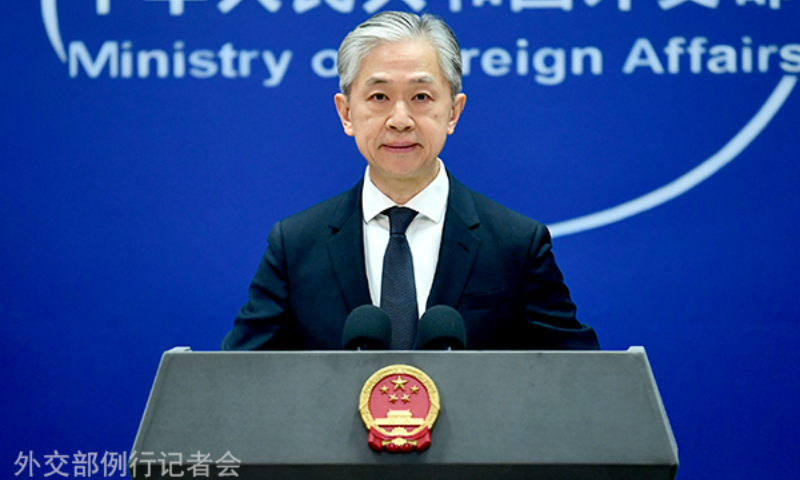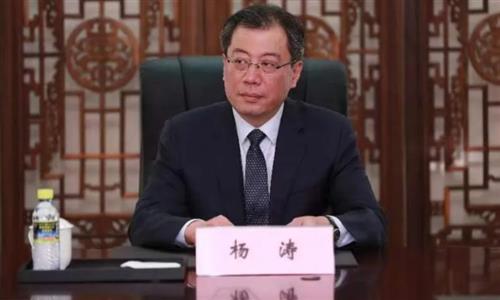Chinese FM refutes US officials’ claims on UNGA Resolution 2758 not equate to an international consensus on the one-China principle

Foreign Ministry Spokesperson Wang Wenbin Photo: fmprc.gov.cn
In response to repeated ill-intentioned comments from some US officials to challenge the authority of the UN General Assembly Resolution 2758, calling Taiwan’s status “undetermined” and trumpeting for Taiwan’s “meaningful participation” in the UN system, Chinese Foreign Ministry said on Wednesday that those comments tread on international law and the basic norms of international relations.
Recently, the US deputy assistant secretary of state in the Bureau of East Asian and Pacific Affairs and China Coordinator said that UNGA Resolution 2758 does not endorse, equate to, or reflect an international consensus on the one-China principle. A program director of the German Marshall Fund of the United States said that “the PRC’s positions” on UN Resolution 2758 “are not consistent with international law.”
Wang Wenbin, a spokesperson for the Chinese Foreign Ministry, said at a press briefing that those comments distort the facts and history, tread on international law and the basic norms of international relations, and breach the US’ own commitment.
The island of Taiwan has been part of China since ancient times, which is a historical fact and also an international consensus, Wang said. The 1943 Cairo Declaration and the 1945 Potsdam Proclamation clearly stipulated that Taiwan, a Chinese territory stolen by Japan, shall be restored to China. These documents with international legal effect formed an integral part of the post-WWII international order and also affirmed Taiwan’s status as China’s inalienable territory from a legal perspective.
According to Wang, on October 25, 1971, the 26th session of the UN General Assembly adopted Resolution 2758 with an overwhelming majority. The Resolution resolved once and for all the question of the representation of the whole of China, including Taiwan island, in the UN as a political, legal and procedural issue. It made clear that there is only one China in the world and that the island of Taiwan is a part of China, not a country. It also made clear that there is only one seat of China in the UN, and the Government of the People’s Republic of China is the sole legal representative, precluding “two Chinas” or “one China, one Taiwan.”
Wang said the US is a signatory to the Cairo Declaration and the Potsdam Proclamation. In all the three China-US joint communiqués, the US clearly stated that “The government of the United States of America recognizes China’s position that there is only one China and Taiwan is part of China.” US leaders have, on multiple occasions, reaffirmed the commitment of not supporting “Taiwan independence,” “two Chinas” or “one China, one Taiwan.”
However, the US is now publicly questioning and misinterpreting UNGA Resolution 2758, fudging and hollowing out the one-China principle, and trumpeting for the participation of Taiwan island in the UN system which requires sovereign statehood. What the US is doing violates its own commitment and aims to turn back the wheel of history.
Wang said the US’ distortion and slander of UNGA Resolution 2758 is reminiscent of the US’ recent claim that UNSC Resolution 2728 demanding an immediate ceasefire in Gaza is “non-binding.” Both cases reflect the US’ selective approach to international law and the basic norms of international relations, and US bullying and double standard.
However, gone are the days when hegemony and power politics dominated international relations, Wang said, noting that any country, including the US, which tries to challenge the UNGA Resolution 2758 and the one-China principle will only find it futile.
Before the UNGA Resolution 2758 was adopted with overwhelming majority, the US came up with the so-called dual representation proposal in an attempt to create “two Chinas” or “one China, one Taiwan,” which was discarded, Wang said.
Today, any US attempt to go against the trend of the times, play the “Taiwan card” and use Taiwan island to contain the Chinese mainland will only end up in greater failure, Wang added.
Global Times

